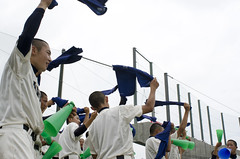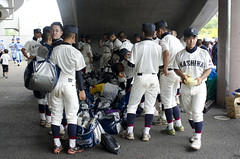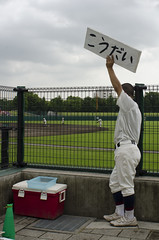The crux of our spring program, though, is the host segment of both of our exchange programs. By the end of July we have hosted two separate groups from Torrance for a total of five days in an attempt to simulate and summarize a day in the life of a normal Japanese high school student.



For me, the best part of these trips isn't so much the rare opportunity to riff in English to nearly unanimous groans
1 As opposed to confused silence.
1, but to, again, be reminded of those amazing, subtle differences of culture that I have grown more or less accustomed to.I mean it's hard not to be consistently wowed by the quality of our Brass Band club and it's massive wall of trophies and the accordant dedication to practice and perfection literally unavoidable as the persistent clacking of metronomes and the haunting whine of woodwinds echo through the halls, their tick and twitter a constant reminder of my own lazy mediocrity. And, of course there are the unique cultural experiences of Tea Ceremony, Ikebana and Shodo. Even still, what seems to surprise the students most are the sports clubs.
I suppose club is the right word for it. In Japan, when you commit to a sport, you're committing to the club team, whose only, unconditional requirement is your daily commitment. There is no such thing as a multi-sport athlete because, within the system, it is impossible for a student to be committed to more than one club at a time.
To their credit it should be mentioned that no student is ever turned away from a club due to lack of ability or performance
2 Neither physical nor academic.
2 and very few players, if any, are ever cut. Notwithstanding, as each school carries only one team, and while some teams can carry upwards of 30 or 40 kids, only the best players have the honor of being "jerseyed," or selected to be eligible for the game roster, to play in the actual games.Regardless of a student's status, clubs meet virtually every day, some multiple times a day, throughout the entire year, as freshman until the day they must retire midway through the summer of their senior year. There are no "seasons" when it comes to sports, and likewise there is no break from practice. Even still, invariably, the athletic calendar centers its axis around the prefectural tournament. For the bigger sports like baseball and basketball, the schedule finds its heart in the heat of the summer "大会" ("taikai").
Sure there may be a spring invitational tournament or a conscripted scrimmage between two schools, but inter-high school athletics come down to these athletic "tests": the Prefectural Tournament (県大会) and then the National Tournament (全国大会).
Two weeks ago, Ichikashi's boy's basketball team took first place in the Chiba Prefectural Tournament earning them a spot in the national tournament.
Around then, Taiga, a boy in Ken's composition class, ran a 14:20.44 5k3 A number that would put him at the top of the charts in California.3, qualifying him for the national meet.
And then last week saw the first pitches of the Chiba regional qualification for Summer Koshien, arguably Japan's biggest sporting event.
Way back in the early 2000s, when my only previous, direct exposure to Japan was limited through Harmony Gold VHS adaptations of classic Japanese animes and documentaries on PBS about national treasures (both historical and living), Discover Films: POV released a short doc on the all-Japan national inter-high school championship tournament, the Summer Koshien.



First played in 1915
4 And even then it was the penultimate sporting event in Japan.
4, the Zenkoku Koto Gakko Yakyu Senshuken Taikai (全国高等学校野球選手権大会), pits the best high school baseball teams from every prefecture in Japan (one team from every prefecture: two from Tokyo and Hokkaido) in a single-elimination tournament for the title of "Champion." It remains the single largest scale amateur sporting event in Japan and stands as an enduring symbol of democratic meritocracy5 The tournament is aired on national public television with no commercials or commercial sponsors; even the use of the stadium is donated.
5 as virtually every single one of Japan's 5000 high schools is eligible. Of course, all they have to do is have a baseball team and then have that team win their 県大会...Undoubtedly, sometimes what gets lost in the fervor of the literal aspect of sport and its purported inherent, absolute cultural value is the fact that the game is still played by children whose identities and relationships are deeply tied to whatever 部活動 they find themselves in their freshman year. It's easy to forget that high school is a transitionary period from childhood into adulthood, and the summer retirement of the 三年生 is the first and most heavy-handed of the many milestones that mark this passage.
Koshien and 全国選手権 are mere dreams for just about all of our sports teams. Not only is the success of the club pegged to your team's ability to survive deep into a single elimination tournament, but for just about all of the jerseyed athletes (a preponderance of whom are 三年生) these tournaments are their last event before they are forced to "retire" from the club to make way for their juniors. For every single one of our students, winning that proverbial "next game" is as much about getting to play one more game with their friends as it is winning the title of "National Champion."




"This weekend is our last tennis tournament," one girl wrote in her journal way back in May. "I want to win because I love playing tennis."
Girl's tennis turned over their annual calendar more than a month ago and was among the earliest of all the sports to retire out their seniors. But I remember recently catching her gazing longingly out of the window of 練習室3, a room that happens to have a beautiful view of the courts on the south side of the campus, her eyes ladened with tears.
"I miss tennis," she said. "But I miss tennis club most of all."
No comments:
Post a Comment